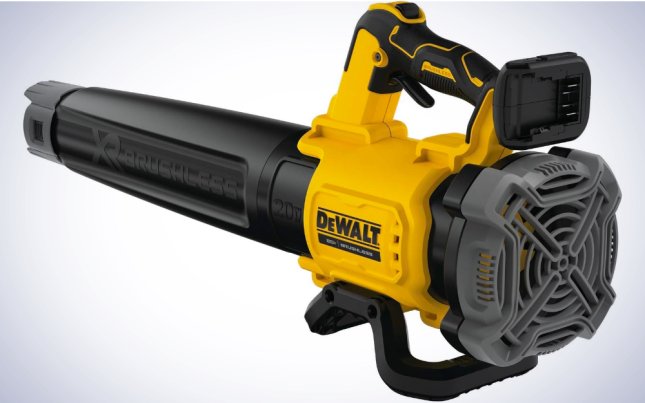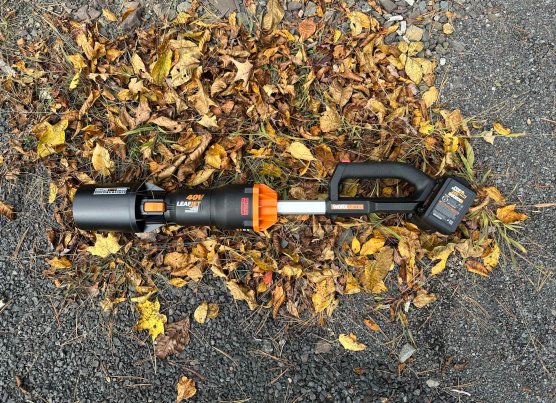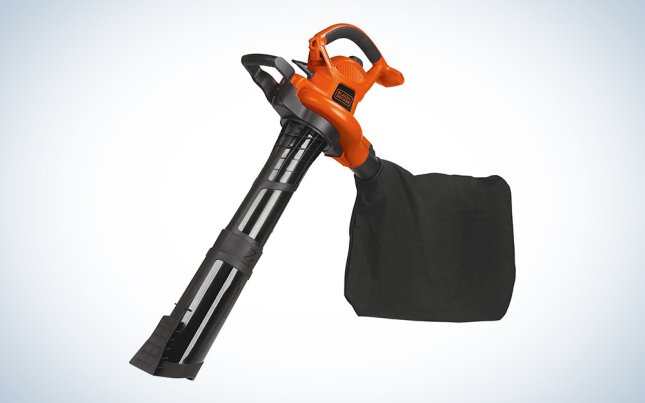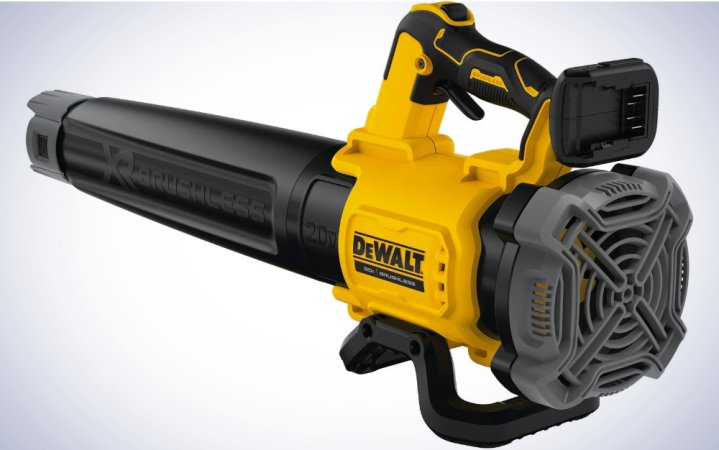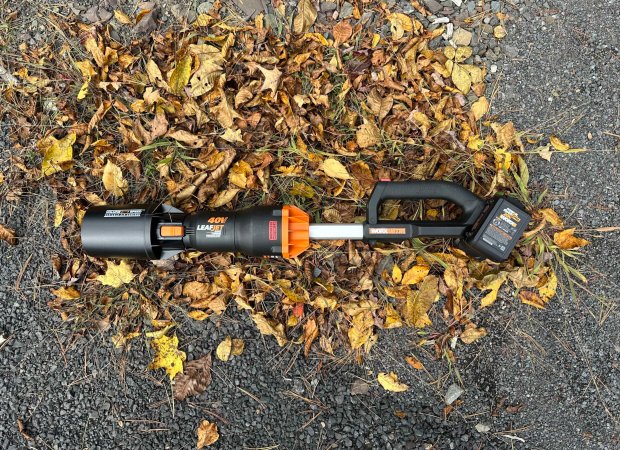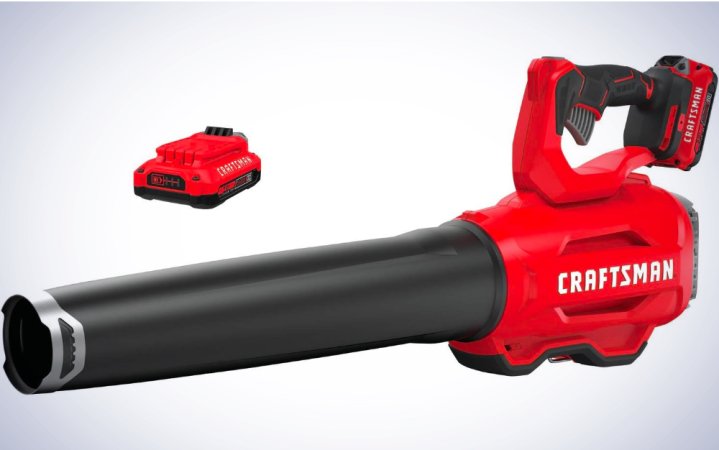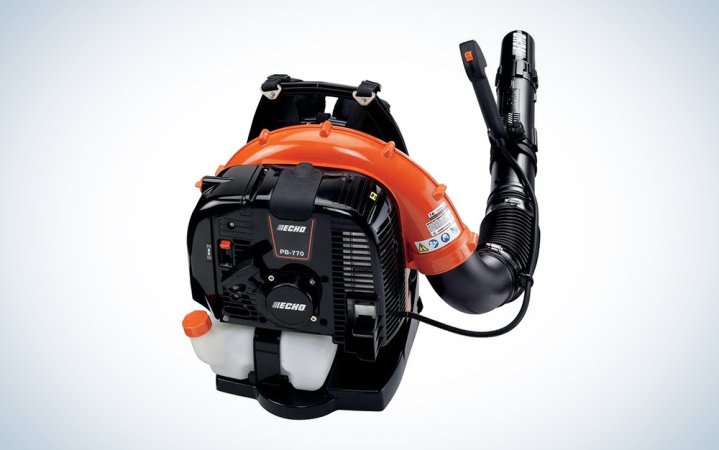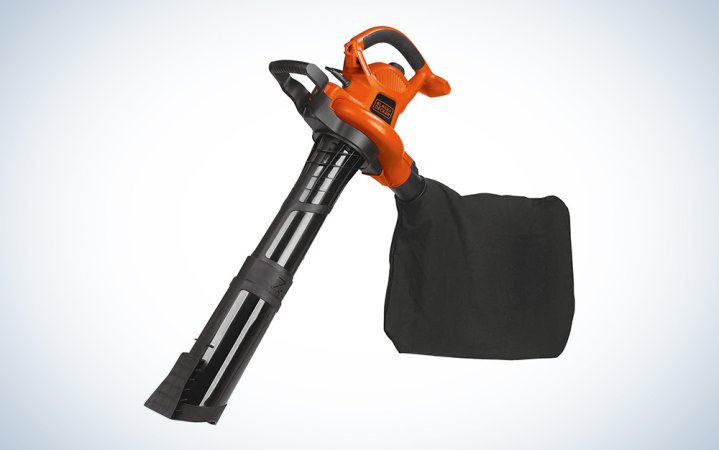We may earn revenue from the products available on this page and participate in affiliate programs. Learn more ›

A great leaf blower makes you want to wake up on a fall day and get to work. It makes you wish your yard was a few acres bigger so you can use your favorite power tool more. But who wants to bother with a leaf blower rental? And trying to borrow a neighbor’s noisy, old leaf blower can feel like pulling teeth. The wrong leaf blower can make you want to pick up a rake to move the few leaves that fell on your front lawn. Purchasing your own leaf blower can have higher upfront costs than renting, but it will save you plenty of headaches—there’s no need to pick up and drop it off, and you don’t have to worry about handling a leaf blower you hate. Effectiveness isn’t the only measure of a blower. If you want to be a good neighbor, you’ll also want to consider just how loud your lawn equipment is, as some communities ban the use of certain kinds of leaf blowers to reduce noise pollution. Here’s how to find the best leaf blower for you.
- Best overall: DeWALT Cordless XR Leaf Blower
- Best cordless: Worx Nitro 40V PRO LEAFJET Cordless Leaf Blower
- Best rechargeable: RYOBI Brushless Cordless Jet Fan Leaf Blower
- Best handheld: CRAFTSMAN Cordless Leaf Blower
- Best backpack: ECHO Gas Backpack Blower
- Best budget: BLACK+DECKER Leaf Blower & Leaf Vacuum
How we chose the best leaf blowers
We looked to product reviews, consumer impressions, and warranted advice from our landscape-loving dads, who are very proud of their yard tools. You deserved to be just as jazzed about a storage shed packed with your own collection of backyard tools as they are.
The best leaf blowers: Reviews & Recommendations
Looking for a tool to move leaves can be stressful, but don’t worry, we’ve got you covered—you don’t have to go back to raking leaves. This guide will take you through the main points to consider while buying a leaf blower while offering up our leaf blower reviews. You can save that stress for when it’s time to choose a snowblower.
Best overall: DeWALT Cordless XR Leaf Blower
Best overall
King of the leaf pile
Pros
- Part of DeWalt’s tool ecosystem
- Brushless motor
- Lightweight
Cons
- Doesn’t come with a battery
Why it made the cut: This professional-grade leaf blower brings crisp landscaping to your backyard.
Specs
- Weight: 5.43 lbs.
- Power source: Battery
- Electric or gas: Electric
- Air speed: 125 MPH
DeWALT’s cordless leaf blower offers an excellent combination of both power—courtesy of its 20V motor—and cost. This battery-powered model can push out air at up to 125 miles per hour, covering an area of 450 cubic feet per minute. A flat concentrator nozzle helps blow away heavier debris. This leaf blower runs on a battery, but DeWALT doesn’t include one with the box; you’ll have to pick one up separately. If you have another DeWALT power tool, there’s a good chance its battery is compatible with this leaf blower, which is one reason to stay within the company’s ecosystem. The company does offer a bundle with a battery and charger for an additional $50 in case you’re totally new to DeWALT power tools, or want a spare.
Best cordless: Worx Nitro 40V PRO LEAFJET Cordless Leaf Blower
Best cordless
Worx Nitro 40V PRO LEAFJET Cordless Leaf Blower
Pros
- Designed with two powerful batteries
- Features 620 CFM blower and has high capacity
- Comes with charger
Cons
- Somer users had issues with battery performance
Why it made the cut: This lightweight cordless leafblower is designed with an efficient brushless motor, yet provides plenty of power, courtesy of two 20-volt batteries.
Specs
- Weight: 6.6 lbs.
- Power source: Battery
- Electric or gas: Electric
- Air speed: 165 MPH
The WORX Nitro Leaf Blower provides plenty of performance for a lightweight, cordless tool. It’s designed with a brushless motor that allows it to run longer and provides quite a bit of power. The two included lithium-ion batteries provide 40 volts of power and 165 MPH of blowing speed. The controls allow you to toggle between four speed settings and the blower also features dual air intakes. The batteries charge to full capacity in two hours, and this blower is compatible with other WORX tools. I also found it useful for blowing away spiderwebs.
Best rechargeable: RYOBI Brushless Cordless Jet Fan Leaf Blower
Best rechargeable
No string attached
Pros
- Quiet
- Light
- Brushless motor
Cons
- Battery and charger sold separately
Why it made the cut: This lightweight, quiet leaf blower packs a powerful punch.
Specs
- Weight: 8.08 lbs.
- Power source: Battery
- Electric or gas: Electric
- Air speed: 125 MPH
This Ryobi leaf blower buzzes along at 125 MPH and is fairly quiet at only 59 decibels. The cordless blower has a battery life approaching half an hour without using turbo mode. It weighs less than 10 pounds, meaning you can teach Junior how to help out in the yard without risking a hospital trip. Don’t let its weight and quietness fool you—this leaf blower runs at 550 CFM, or cubic feet per minute, and rivals the power of many gas-powered leaf blowers. This means you can clean the yard and driveway faster than Junior tries to bail out of their yard duties. Not today, Junior!
Best handheld: CRAFTSMAN Cordless Leaf Blower
Best handheld
Power hour
Pros
- Completely wireless
- Powerful
- Includes multiple batteries and charger
Cons
- Not for heavy use
Why it made the cut: A large, translucent fuel tank takes the guesswork out of filling up this leaf blower.
Specs
- Weight: 8 lbs.
- Power source: Battery
- Electric or gas: Electric
- Air speed: 100 MPH
This CRAFTSMAN leaf blower is relatively lightweight, runs on a battery, and includes all of the necessary charging accessories. With a maximum speed of 100 MPH, this leaf blower will offer respectable performance given its size. You’ll only be able to get through roughly a quarter of an acre of land per cleaning session off a single fully charged battery, but the bundle we’re recommending comes with two. If you have a larger backyard, it would be wise to invest in a more heavy-duty leaf blower.
Best backpack: ECHO Gas Backpack Blower
ECHO Gas Backpack Blower
Pros
- Powerful
- Covers lots of ground
- No tingly hands from vibrations
Cons
- Heavy
- Expensive
Why it made the cut: This powerful leaf blower takes the strain off your hands to make yard work a breeze.
Specs
- Weight: 29 lbs.
- Power source: Engine
- Electric or gas: Gas
- Air speed: 234 MPH
This ECHO leaf blower blows 234 MPH and has an airflow capacity of 765 CFM, which makes it perfect for those with plenty of acres to cover or who landscape on the side. Keep in mind that it weighs 29 pounds, though, so it might be cumbersome to wear for long periods of time. However, the comfortable straps help ease the burden on your shoulders. Although this leaf blower packs a hefty price tag, reviewers note its longevity and power, meaning this investment purchase pays for itself.
Best budget: BLACK+DECKER Leaf Blower & Leaf Vacuum
Best budget
Leaf your wallet
Pros
- Three tools in one
- Easy leaf disposal
Cons
- Needs practice to handle
Why it made the cut: This versatile piece of equipment vacuum leaves not the cash in your wallet.
Specs
- Weight: 8.1 lbs.
- Power source: Corded
- Electric or gas: Electric
- Air speed: 250 MPH
This Black+Decker leaf blower provides leaf blowing and vacuuming and a bag for mulching. Twelve amps of power deliver up to 250 MPH of blowing speed. You can conveniently grind down up to 16 bags of mulch into one with this leaf blower vacuum. Reviewers note that it works on small debris, but be aware that it takes a bit of practice to handle—vacuuming too fast will clog the tube. It’s quiet despite its power, meaning you won’t alert the entire neighborhood that you’re doing yard work. Two disposable bags are included for fast clean-up.
What to consider when buying the best leaf blowers
Walking into a home and garden store can be overwhelming, between the high ceilings and bounty of charcoal grills. How can you focus on picking out the best leaf blower when there are at least 20 varieties of riding lawn mower five feet away? We’ve done all the work for you, so leave the choice paralysis for the chip aisle at the grocery store.
Power source
When considering the best leaf blower, you’ll first need to decide between gas, electric, and battery-powered models. Gas models are generally more powerful than electric models and freedom from a cord means they can go just about anywhere. However, they are considerably noisier, heavier than electric models, and put out pollution tied to fossil fuels. Electric models are lighter than gas and can provide the kind of power that will cover a large swath of jobs—however, their mobility is limited to about 100 feet of an outlet (give or take one of the best extension cords). Battery-powered models spare users from the maintenance required of gas blowers but have less power. The biggest mark against battery-powered leaf blowers is that batteries generally only last up to an hour. That means big jobs will take much longer, as you’ll need to recharge. (Of course, you can also check out the best solar generators so you can take a portable power station around with you to keep a steady rotation of charging battery packs.)
Power
To gauge the power of a blower, you’ll want to look at the cubic feet per minute (CFM) rating and promised miles per hour (MPH). The higher CFM, the more leaves you’ll be able to blow away at one time. The higher the MPH, the easier it will be to move heavier debris or wet leaves.
Once you get through that basic consideration, you might want to consider other features like vacuuming and mulching features, which store and shred yard waste. For professional-grade yard maintenance across multiple acres, you’ll want to consider backpack models that pack extra power, or even wheeled models. Keep in mind though, that wheeled models come with their own drawbacks, like a lack of features and considerably high noise levels.
Cordless vs. corded
When it comes to convenience, cordless leaf blowers are at the top of the pack. They dispense with the need for gas and maintenance required by gas-powered blowers as well as their noisiness. A cordless blower also tends to be fairly light and allows you to go wherever you need without worrying if you’re close to an outlet. However, even the best cordless blower doesn’t tend to have the same power as its gas-powered brethren and with a battery life of around one hour, you may have to charge once or twice before finishing your chores or consider investing in a second battery.
Corded leaf blowers are ideal for backyards that provide access to outlets at 100 feet of your work zone. They provide power nearly as strong as gas-powered motors and are generally much lighter.
Electric vs. gas
Gas leaf blowers feature high power and the convenience of not having a cord. However, they require regular maintenance, and two-stroke engines featured in the majority of gas blowers require mixing gas and oil. Try to look for four-stroke engines instead to do away with the need for mixing gas and oil and to reduce emissions. Another drawback to gas leaf blowers is their sound level—it’s often recommended to wear hearing protection when operating them. Most models also weigh about 10 pounds, which might be disqualifying for some users. Electric leaf blowers offer the convenience of a button-press start and do away with the noise and environmental pollution of gas blowers.
Backpack vs. handheld
Backpack leaf blowers arm users with power twice that of their handheld competitors. The tradeoff is the drawbacks associated with gas engines—maintenance, fuel mixing, noise pollution, and air pollution. They offer way more power than folks with a small front yard or even a sizable backyard need. But if you’re dealing with major acreage that has to be maintained meticulously and quickly, you may want to consider a backpack blower. Handheld leaf blowers are good for cleaning up your driveway, but the vibrations might make your hands hurt if used for an extended period of time.
Price range
A budget leaf blower will give you what you need to deal with your sidewalk and moderately sized yard. You’ll be able to find decent corded models for around $100. In some cases, you’ll find deals that get you models with useful features like mulching and vacuuming. Just expect lower CFM rates, which means you might have to spend longer blowing.
FAQs
Over 20 cities in California have banned leaf blowers due to the noise they create, although enforcement of the ban is spotty. Some cities, including Greenwich, Connecticut, and Palm Beach, Florida, regulate the decibel volume and times of use of leaf blowers. To find your city’s rules on leaf blowers, you can check here. Your local government website may have more up-to-date information.
Cordless leaf blowers offer the kind of maneuverability to safely work on your roof. They are generally lighter than gas-powered models and won’t force you to deal with the noise of a gas-powered model as it ricochets off your roof and across the neighborhood. Yes, you might have to recharge your blower—but odds are your gutters aren’t going to need hours of power to get things clean.
Before using your blower, make sure you’ve taken your safety into account. Put on a pair of safety goggles to protect your eyes from debris, and don a pair of earmuffs or earplugs to protect your hearing. Check that the leaves you are blowing are mostly dry, and that wind is low. Plan to blow your leaves in one direction using air pulses while pointing the nozzle at a shallow angle toward the ground. Sweep the blower from side to side while blowing leaves into a pile.
If using a leaf blower to vacuum leaves, no. They can clog the fan, prevent other debris from being sucked up, weigh down the tool, and cause bag attachments to break. However, if you’re blowing away wet leaves, by all means, yes. It might take more work, but it can be done.
It depends. A higher CFM pushes leaves further and helps you clear a larger area faster. This is important if you’re working with light materials. However, a higher MPH will help move heavier objects, like wet leaves and larger rocks. Take both into consideration when purchasing a leaf blower.
Our leaf blower recommendations cost between $92 and $529.
Finals thoughts on the best leaf blowers
- Best overall: DeWALT Cordless XR Leaf Blower
- Best rechargeable: RYOBI Brushless Cordless Jet Fan Leaf Blower
- Best handheld: CRAFTSMAN Cordless Leaf Blower
- Best cordless: Worx Nitro 40V PRO LEAFJET Cordless Leaf Blower
- Best backpack: ECHO Gas Backpack Blower
- Best budget: BLACK+DECKER Leaf Blower & Leaf Vacuum
When buying a leaf blower, your first major consideration should be the demands of the property you are tending. Do you have access to power outlets? Do you have acres or a small backyard? This will tell you whether it’s worth buying a larger gas-powered model, or if you can stick with a corded or wireless model. From there, you’ll want to consider what kind of power tool owner you are. Are you someone who likes maintaining your landscaping tools, checking the engine, and mixing gas? Or do you simply want to plug something in or charge a battery?
Your environment also comes into play when considering how much power you’ll need. Are you dealing with debris other than leaves? Do you have close neighbors who will object to loud engine noise? Once you’ve reached this conclusion, you’ll want to set a price range. Remember that CFM rating will tell you how many leaves your tool can move at once, and MPH will tell you how it can handle heavier debris. Now you’re well on your way to finding the best blower for your home.
